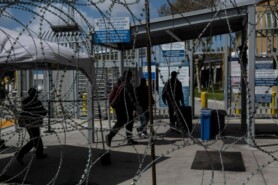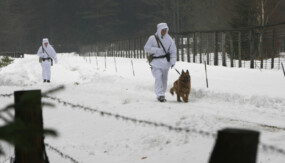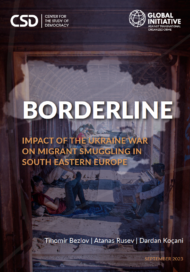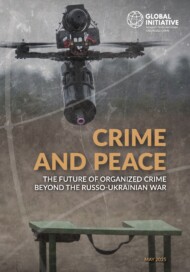Posted on 18 Jun 2025
On 19 May 2025, Lithuania filed a case against Belarus at the International Court of Justice (ICJ), accusing Alexander Lukashenko’s regime of breaching the UN Protocol Against the Smuggling of Migrants by Land, Sea and Air through what is described as ‘alleged’ involvement in enabling irregular migrant flows to the country. Shortly after, at the 34th session of the UN Commission on Crime Prevention and Criminal Justice in Vienna, Belarus’s delegation refuted the accusations. In their statement, the delegation alluded to the relatively small number of irregular migrants entering the EU via Belarus when compared with the numbers entering from the Balkan, Mediterranean and other smuggling routes.
However, while this statement is true in terms of raw numbers, the trend tells a different story. Although the number of irregular crossings is higher along key European corridors, including the Central and Eastern Mediterranean, Western African and English Channel routes – the EU saw a sharp overall decline in irregular crossings in 2024, a trend that has continued into 2025. The major exception to this was the route via Belarus and Ukraine, where there was a 192 per cent increase in irregular crossings, according to Frontex.
A manufactured migration crisis
Belarus’s emergence as a migrant smuggling hub is rooted in the events of 2021, when the EU imposed sanctions and closed its airspace to Belarusian aircraft after the regime forced a passenger plane carrying a dissident journalist, en route to Lithuania, to land at Minsk National Airport. In response to the sanctions, Lukashenko threatened to stop preventing the flow of drugs and irregular migrants into the EU, and instead began creating pathways for them.
The Belarusian government introduced direct flights and simplified bureaucratic entry procedures for nationals of several source countries. A dozen tourist organizations – most of which were linked to the regime – were overseeing this process, having received exclusive rights to issue invitations to visit Belarus. Belarusian border guards have been accused of aiding migrants by sharing information about evading enforcement on the other side of the border and providing tools to climb over or cut through border fences. Since 2021, EU states have accused Belarus of weaponizing migration to blemish the record of European governments and fuel division on the EU’s migration policy.
People smugglers quickly moved in to exploit these new legal pathways: along the route, the criminal networks coordinating the journeys included Syrian, Turkish, Russian, Belarusian, Ukrainian and Polish nationals. As a result, irregular crossings from Belarus into neighbouring Poland, Lithuania and Latvia began to spike. In 2021, thousands of migrants from Afghanistan, Iraq, Syria, Yemen and other countries were stranded at the Belarusian border with Poland for several months in harsh weather conditions.
Attempted crossings waned in 2022, but the situation had escalated again by mid-2023, with signs that Russia was now involved in orchestrating irregular migration, as some migrants began arriving in Moscow to be transported to Belarus’s border with the EU. Today, countries such as Poland and Lithuania continue to report daily irregular crossing attempts. Reports by border guards in Poland suggest that migrants from countries that were not sources in 2021, when the surge began, including Eritrea, Somalia, Sudan and Yemen, have attempted crossings, pointing to the increasing popularity of the Belarusian smuggling route. At least 88 people have died on the route since the beginning of the crisis.
Evasive accountability
The threat of international condemnation is unlikely to prevent Belarus from continuing to enable human smuggling through its borders. As the war in Ukraine continues, one can hardly expect any thawing of relations between the EU and Belarus, a country indirectly engaging in the conflict on Russia’s side by allowing its territory to be used for launching attacks on Ukraine. Amid international isolation, the flows of irregular migrants are increasingly valuable as a source of revenue for the regime and its elements, and an instrument of aggressive foreign policy. The instrumentalization of organized criminal activities to advance state interests has become increasingly common – the Global Initiative Against Transnational Organized Crime has coined the term ‘geocriminality’ to describe this trend.
Lithuania is seeking guarantees that Belarus’s actions will not be repeated, as well as full compensation for its border enforcement measures, including the construction of a 500-kilometre-long wall. The Polish authorities have also indicated that they are considering participating in the case. A negative ICJ ruling could put a significant financial burden on Belarus and deal another blow to its already tarnished international reputation. However, it remains unclear how the Belarusian regime – previously referred to the International Criminal Court for alleged crimes against humanity – might respond to further international pressure. Furthermore, the case could hinder prospects for cross-border cooperation to disrupt migrant smuggling operations. Amid escalating tensions in the region – with Lithuania and Poland bracing themselves for a potential Russian invasion – tackling human smuggling will be challenging.
Nevertheless, bringing Belarus to the ICJ represents a milestone in holding state-embedded actors accountable for their role in enabling human smuggling. Beyond signalling the international community’s resolve to take its commitments under the Smuggling Protocol seriously, the case may open up possibilities of rethinking the international response to other migration crises in Europe and beyond, and put the role of state-embedded actors under greater scrutiny.



